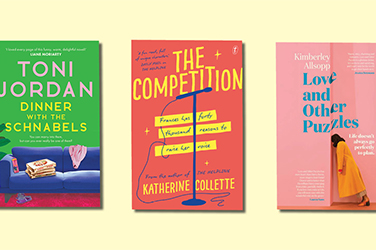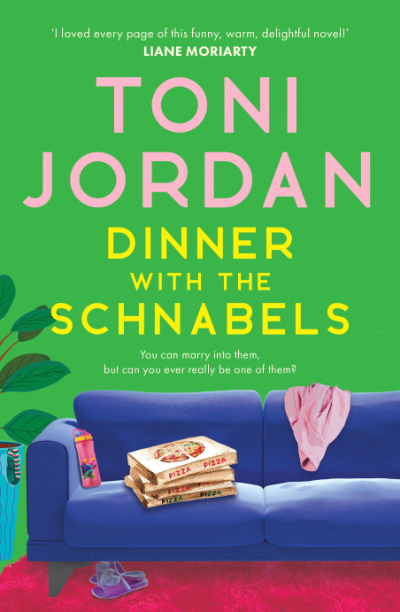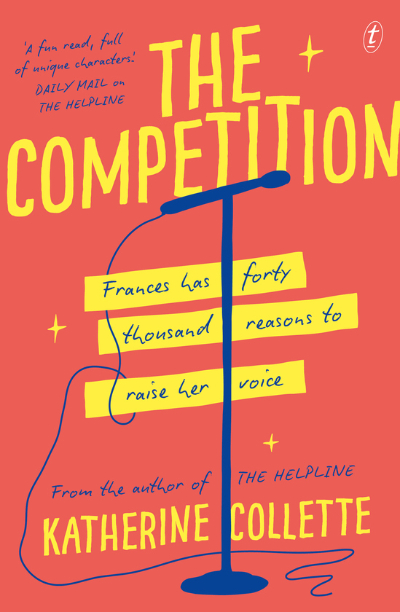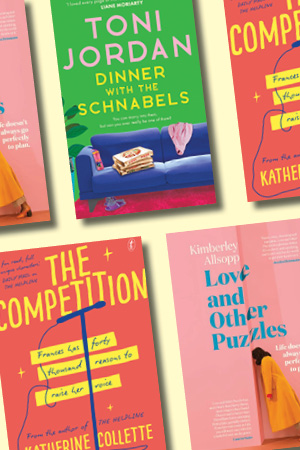- Free Article: No
- Contents Category: Fiction
- Custom Article Title: New comic novels by Toni Jordan, Katherine Collette, and Kimberley Allsopp
- Review Article: Yes
- Article Title: Literary escapism
- Article Subtitle: Three new comic novels
- Online Only: No
- Custom Highlight Text:
oubtless there will come a time when one’s more disciplined reading self requires nourishment from serious books that offer sustained intellectual, creative, and moral challenges. In the meantime, books – in particular the contemporary urban novel – may continue to satisfy by being charming, delightful, witty, heart-warming, hilarious, astringently refreshing, sharply observed, and deliciously original.
- Featured Image (400px * 250px):

- Alt Tag (Featured Image): Debra Adelaide reviews 'Dinner with the Schnabels' by Toni Jordan, 'The Competition' by Katherine Collette, and 'Love and Other Puzzles' by Kimberley Allsopp
That is just one critical approach. Another is to acknowledge the substance with which these novels are tempered. Despite the jokes, the characters who spring from crisis to crisis like tennis balls, the commercial storylines that inevitably deliver a positive ending, they do in fact air some sober themes, of which bouncy resilience is just one. Culpability, forgiveness, personal responsibility, self-awareness, the capacity to change, and plain old human decency are all presented here for consideration. No one can argue with this, and it is to all three novels’ credit that not one could be accused of trying to strong-arm the reader into any moral, political, or ethical position.
 Dinner with the Schnabels by Toni Jordan
Dinner with the Schnabels by Toni Jordan
Hachette, $32.99 pb, 361 pp
A new Toni Jordan title is always welcome and this one, her sixth, is as lively and joyous as promised. Dinner with the Schnabels explores family dynamics, specifically the trust that allows couples to stay buoyant in the sea of failure and disappointment inevitable after several years of marriage, children, and financial pressure. The protagonist is Simon Larsen, a daggy dad whose failed architecture business has reduced him materially and emotionally to such scruffy abjection and idleness that he is tasked by his wife and mother-in-law with landscaping a friend’s backyard for a special family celebration. He has one week to do it, so of course he procrastinates, and numerous events naturally sidetrack the project, but Simon will also inevitably finish it. Besides, we know it is never about the destination, rather the journey – and ultimately Simon will achieve self-awareness. The novel is so technically accomplished and tightly structured that any obviousness in the central premise is smoothed away.
It would have been good had the prologue not been such an artifice, and the monstrous mother-in-law stereotype not quite so overdone (though it is executed with much sharp comedy). On the other hand, the two child characters are great company, original and unsentimental, while everything about the unexpected appearance of Simon’s wife’s half-sister is a hugely effective hand grenade, destabilising matters in ways impossible to anticipate. The overall effect is one of beguiling charm. While Dinner with the Schnabels is not likely to compel a reread in a hurry, I felt sorry to farewell the Larsen-Schnabel family, which says a great deal for the power of that charm.
 The Competition by Katherine Collette
The Competition by Katherine Collette
Text Publishing, $22.99 pb, 351 pp
Fans of Katherine Collette’s first novel, The Helpline (2018), will be as keen for her second as Jordan’s fans will be for her sixth. The Helpline utilised a now common character in contemporary fiction: the quirky, awkward, on-the-spectrum outsider, familiar from novels like The Rosie Project (2013) and indeed from Jordan’s first wonderful novel, Addition (2008). The Competition continues in this vein with a main character, Frances, who is so acidly witty, distant, and abrasive, that she is hard to warm to – but that is the hook. We know that the reasons she has abandoned her supermarket job in Melbourne, stolen her absent parents’ spare credit card to participate in a SpeechMakers annual competition in Brisbane, and is now avoiding a certain person from her schooldays (and the reason why she never actually finished school) will all be revealed. Because there is quite a bit more going on.
Frances prides herself on being able to deliver ‘a thousand harsh retorts’ as her kind of ‘super-power’, hence her rapid escalation through SpeechMakers’ national championship levels. But interestingly in a novel so focused on the spoken word, it seems that what remains unsaid is just as powerful and significant, and possibly more so. Her lies are not just mistruths but represent a fundamental inability to enunciate, literally, her real problems and to confront her true self. This is a trope the novel exploits consistently, bringing Frances to understand the contradiction within successful public speaking: that it requires a gift of the personal. Will she speak the truth or just tell a good story? Or can she do both?
Once again, this novel is about the journey although the ending is also full of surprising events. But what distinguishes The Competition is that, among the dry humour and deft plot twists, there are some compelling questions raised about ordinary and often ugly human behaviour. In particular, the thoughtless bullying of schoolmates is exposed in all its cruelty as Frances is forced to deal with her past, while her mentor, Keith, experiences a subtle transformation from boring, judgemental pedantry into selflessness in a way that is quietly moving.
 Love and Other Puzzles by Kimberley Allsopp
Love and Other Puzzles by Kimberley Allsopp
HarperCollins, $29.99 pb, 277 pp
Love and Other Puzzles, Kimberley Allsopp’s first novel, is one of the titles promoted as witty and delightful, but it is more than that, being genuinely hilarious. I am still wiping my eyes over scenes such as the one where the protagonist flees an excruciating family dinner through the restaurant toilet window, aided by a dry-witted and resourceful waiter. The novel soon overcomes its somewhat exhausting one-liner approach to settle into a storyline delivering the necessary mishaps, endearments, and blunders that are part of the rom-com deal. This is deliberate as the narrator, Rory, is obsessed with that genre, and is herself a cautious, conservative, lovable sort of loser whose menial position in a newspaper is partly responsible for her early-life crisis and sparks an unwise decision made to impress her boss. Naturally, a chain of chaotic events ensues, culminating in a resolution that makes everyone happy, including the reader.
Comic side notes are delivered via things like Rory’s limp boyfriend, an artist whose genius is manifested in a project of paintings blending literary and culinary themes: Mary Shellfish, Charles Chickens, Tim Wonton, etc. Ephemeral but still very funny. There are also some excellent minor characters, such as Rory’s bus driver, showing Allsopp’s immense talent and boundless imagination.
From the front cover on, the story of young abject love is signalled so clearly that we know all boxes of the genre will be ticked. There’s no crime in this – it would even be unfair to disappoint your demographic – but the inevitability that is also a part of the deal is obviously a risk. However a really good genre novel will offer enough original touches to wrench it back from the brink. In Love and Other Puzzles the most appealing feature is the conscripting of crosswords – Rory’s own, and those from the New York Times – into the storyline and indeed the resolution. It could only have been bettered if they were cryptic crosswords. Still, the addictive agency of these puzzles is something crossword lovers will appreciate.
In this, the novel’s themes of the puzzling language of love and the love of puzzling language meld cleverly. The trajectory of Rory’s self-destructive but benign personality might be totally predictable but it is tempered by her super sharp wit, and – her most endearing quality of all – cruciverbalism. I’ve been waiting for years to use that word in a review.



Comments powered by CComment